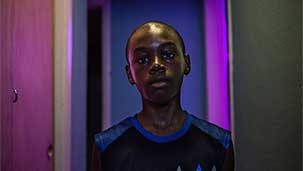Dear Fellow Critics,
Usually when someone references the Roger Ebert quote “...for me, the movies are like a machine that generates empathy...” they’re applying those words to a movie that fails to reach that standard. In the case of Moonlight, it seems that Ebert time-travelled forward, saw this film, and then had his eureka moment.
Moonlight, like Picasso’s Guernica, or Kenji Mizoguchi’s Sansho The Baliff, evokes the universal while engaging in a granular depiction of the specific. Chiron (Moonlight’s singular protagonist—although he is played by three different actors) is inextricably linked to particular times and places and has a specificity that feels utterly genuine. Yet the movie somehow managed to unearth memories from my life, some of which are over forty years old.
There is a brief scene early in the film where Chiron—called Little in this preadolescent iteration of his character—is sitting across a breakfast table with Juan (a tremendous and atypical depiction of a drug kingpin by Mahershala Ali) and his partner Theresa. In the scene a child essentially asks a drug dealer “what does faggot mean?” Jesus. Juan’s answer was compassionate, yet still clearly the product of someone who understands some hard truths about how the world works. The film could have ended there and I would have walked away thinking how lucky I was to have seen this fifteen minute work.
Because while I’m neither African American, nor gay, nor was I raised in the projects of Miami, that specific moment paralleled a profound experience in my own life that, looking back, was entirely formative. And perhaps, more crucially, Moonlight changed what that memory meant to me.
I was congenitally ill-equipped to navigate the byzantine and often cruel politics of childhood. While I was a bright and generally happy child, I just didn’t understand the larger game. In fact I wasn’t even aware I was playing the game. So one morning, the day after the umpteenth time I was chased home by a rock-throwing mob, I sat eating my cereal. As the usual dread grew a lump in my stomach, I asked my Mom a straightforward question: “is there something wrong with me?”
That my Mom didn’t have a pithy answer is just one of the fundamental differences between life and the movies. Although I’m pretty sure I remember a look of pity, mixed with despair. That was a look that I would see on her face more than few times in my life.
If this all seems a little autobiographical it is only to illustrate how effectively Moonlight dug around in my psyche. This film got to me in a way few films ever have. It was an unsettling experience, but in the best kind of way.
In most cases that would be enough for me to champion this film, but it is surprisingly not the aspect of Moonlight that has taken up the majority of my inner dialogue regarding this piece of fucking capital A art.
As effective as Moonlight is at creating connective tissue between the audience and the characters, what was most profound about the film was how it underlined the differences between my life and Chiron’s; that my small circle of experience will never encompass what it was like for him to grow up in circumstances I couldn’t begin to imagine. It is here that the specifics of his existence, so artfully wrought, make clear the importance of caution. Each frame of this film underscores a life fraught with obstacles and Gordian knots that probably would have crushed me long before I reached a place where I was even marginally capable of navigating them.
As a consequence of this, the most important thing I took away from Moonlight was a powerful reminder of the vast chasm between my lived experience and that of any other human. That while I may have glimpses into certain shared experiences, it is far removed from understanding the totality of other people’s history. That truth should leaven any sweeping pronouncements any of us make about understanding and empathy. To do otherwise is like living in a house balanced on a single twig.
Precipitous to say the least.
In the same way I will never be able to truly empathize with what it was like to cower under the falling bombs as the Stuka’s obliterated Guernica, nor will I ever really truly appreciate the existential sorrow of peasant life in feudal Japan, my understanding of Chiron’s life is filament thin. The most any film, or person, can hope to do is create and fleetingly sustain moments of tenuous connection. Any other claims are specious and fundamentally disrespectful.
That those two seemingly contradictory messages—that we all share some commonality but it is our differences that shape us and our relationships to one another—can exist, in exquisite tension, in one transcendent film is why Moonlight is, by far, the best film of 2016.
Sincerely,

Tim




